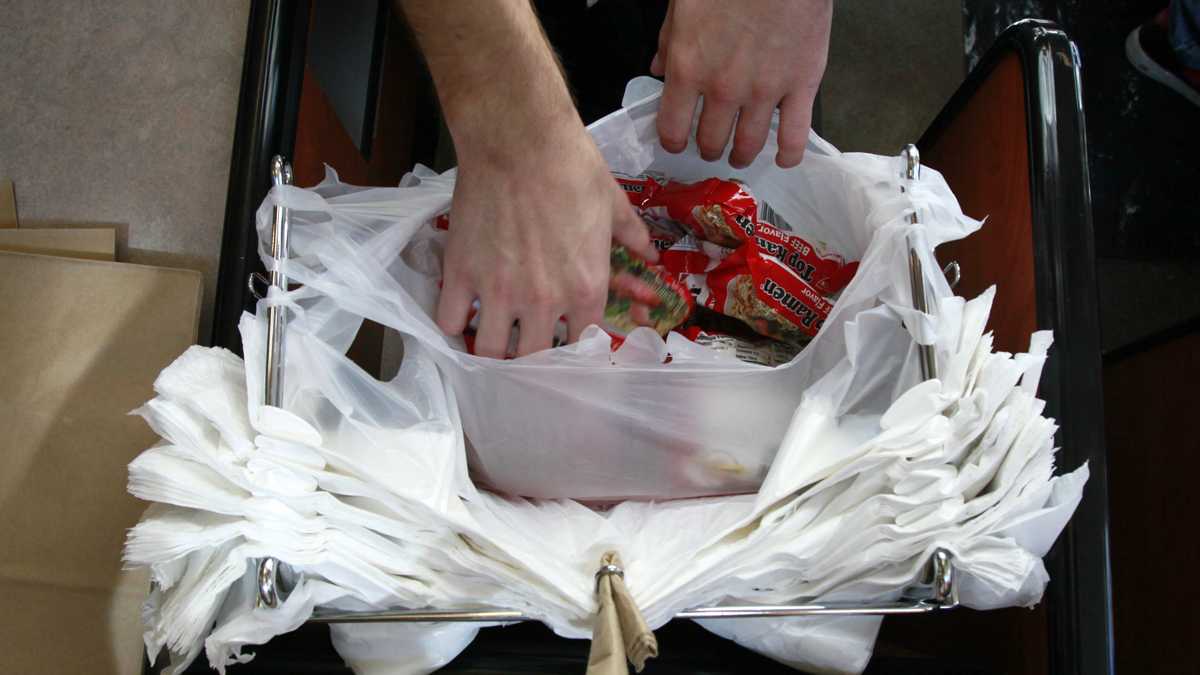Delaware shoppers may have to pay for plastic

(AP file photo)
Legislation encouraging shoppers to ditch plastic bags and bring reusable ones got wide support from local politicians and environmental advocates.
Sponsored by Rep. Deborah Hudson, R-Fairthorne, the legislation would give shoppers the option of bringing their own bag or paying 5 cents for a plastic bag at checkout.
“Each city probably takes home about 500 of these single use bags a year—that’s a trash and pollution problem,” Hudson said. “Surely the grocer charges for the bag anyway. Now we’re trying to change shopper behavior.”
Environmentalists say plastic bag waste clogs up storm drains, enters marine environments and harms animals and photodegrades into small bits that get eaten by fish. Hudson said she hopes her legislation will prevent these issues.
The money the grocery stores make from the 5 cents also would be put towards a recycling and education campaign headed by the stores.
The bill, which has several Republican and Democratic sponsors, is waiting to be read in committee, where it must be held before it can be voted on in the general assembly.
Rep. Valerie Longhurst, D-Bear, passed legislation in 2009 that requires retailers to establish a recycling program that allows customers to bring back their plastic bags. The stores must have collection bins in a prominent location to its business for the returned bags, which will then be sent for recycling. Stores also must provide educational materials on recycling and make reusable bags available.
Julie Miro Wenger, executive director of the Delaware Food Industry Council, said the recycling bins have been successful, and shoppers are taking advantage of them.
“Since the program first started, most stores would tell you the amount of time the bin has to be emptied has increased,” she said. “More people are accustomed to bringing the bags back.”
According to Bring Your Own Bag Delaware, a campaign launched by the Brandywine Sprouts program out of the Jane Goodall Institute in 2011 to educate the public about the issue of plastic bag pollution,”…no other state in the U.S. has yet done it.” Dee Durham, co-founder of the campaign, said she believes Hudson’s legislation is the appropriate next step to fight pollution.
Since Hudson introduced the legislation thirty entities and 1,500 Delaware residents have supported the bill, Durham said.
“I think Delaware is ready for this step, and it’s obvious when you drive down the road the current law isn’t doing enough to prevent these bags getting into our environment,” said Durham, who has been active in several environmental groups in Delaware.
Last month the Wilmington City Council also passed a resolution sponsored by Councilman Bud Freel that endorses Hudson’s legislation.
“We all have to be conscious about our environment,” Wilmington City Council President Theo Gregory said.
“Plastic bags are a danger to wildlife, they cause flooding in various communities by clogging up drains—and people don’t realize this but they are made out of oil, and it causes oil prices to go up.”
While some have argued 5 cents would put a burden of low-income shoppers, Gregory argues multi-use bags are readily available and have been for some time in low-income neighborhoods.
He said plastic bag pollution is an issue his family and many Wilmington residents have expressed concern about.
“Our drains are constantly being clogged up with plastic bags and birds are ingesting plastic bags and they get sick and a lot of them die from plastic bags, and it clutters throughout the street,” Gregory said.
Miro Wenger said she believes grocery store owners and managers understand the issue of plastic bag pollutions and the legislation may help reduce plastic bag excess.
“Grocery stores overall are excellent stewards of the environment and are typically on the cutting edge of ways to conserve or recycle. They recycle all kinds of film, cardboards and pallets and have done that for a number of years,” she said.
“Typically retailers would get on board with that and this does seem to be legislation that could certainly change behavior in a relatively short amount of time by getting people to think about using less bags.”
However, Wenger said the need for plastic bags will still exist because after bringing home groceries, many people use the bags for pooper scoopers when they walk their dog or as trash bags.
“Many people, I would expect, would still opt to pay the 5 cents for the convenience of using that bag for other purposes in their home,” she said.
Hudson said she believed 5 cents would be enough to make a statement and encourage people to think about the environmental hazards plastic bags cause.
“I just want to raise the level of awareness,” Hudson said. “I want people to think about it when they drive around and see the bags in the trees. It takes too long for them to degrade so it’s something we should address.”
WHYY is your source for fact-based, in-depth journalism and information. As a nonprofit organization, we rely on financial support from readers like you. Please give today.





